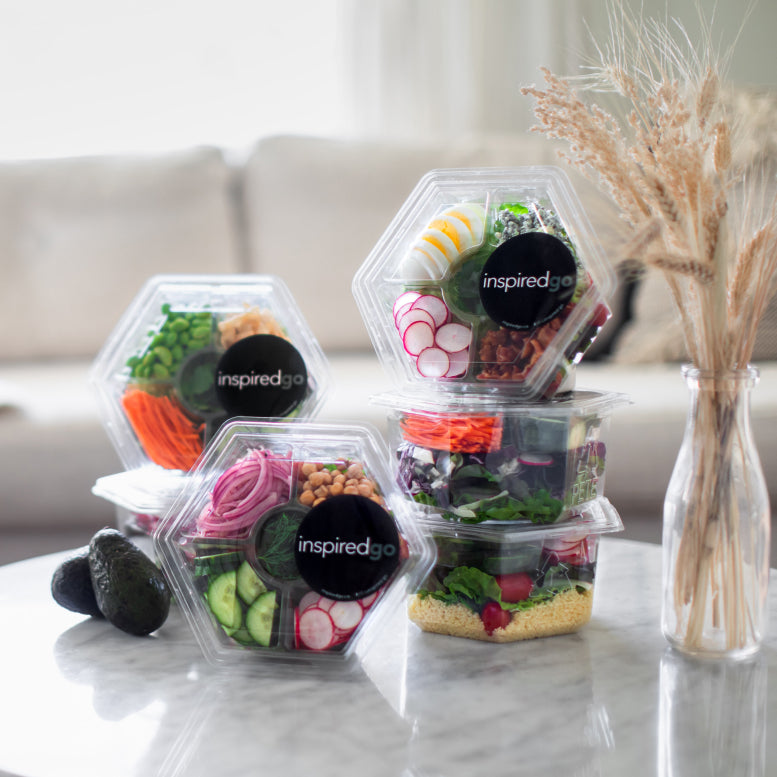What Makes A Salad Vegan?
Table of Contents
1. Understanding the Characteristics of a Vegan Salad
2. Are Vegan Salads Filling Enough for a Complete Meal?
3. Do Salads Support Your Digestive System?
4. How Does Inspired Go Support Vegan Based Diets?
1. Understanding the Characteristics of a Vegan Salad
A vegan salad, as the name implies, is a salad that strictly adheres to the principles of a vegan diet. This means it does not contain any animal products or byproducts. From the greens to the dressing, every component of a vegan salad must be plant-based. This includes the absence of ingredients like meat, eggs, dairy products, and even certain types of honey that involve direct exploitation of bees. A vegan salad can be an amalgamation of various fruits, vegetables, legumes, grains, nuts, and seeds, making it a powerhouse of nutrients. Vegan dressings usually consist of plant-based oils, vinegar, and a myriad of herbs and spices to enhance the flavor. Despite the absence of animal-derived ingredients, a well-crafted vegan salad can offer a rich variety of textures and flavors, ensuring a satisfying and nutritious meal option.
Order fresh salads today →


2. Are Vegan Salads Filling Enough for a Complete Meal?
A common misconception is that vegan salads leave you hungry, but when designed thoughtfully, they can be as hearty and satisfying as any traditional meal. A well-structured vegan salad balances fiber-rich vegetables with plant-based proteins like chickpeas, tofu, or lentils, along with healthy fats from seeds, nuts, or olive oil-based dressings. These components work together to deliver sustained energy, reduce cravings, and keep you feeling full for hours without unnecessary heaviness. Whole grains or legumes included in some recipes add complex carbohydrates that further enhance satiety and provide a steady source of fuel throughout the day. The combination of fiber, protein, and healthy fats also helps stabilize blood sugar levels, preventing energy crashes. Choosing salads with nutrient-dense ingredients ensures you meet your calorie needs while supporting optimal digestion and overall vitality.
Choose your salads and schedule delivery →
3. Do Salads Support Your Digestive System?
Salads are naturally rich in dietary fiber, which is essential for maintaining a healthy gut microbiome and smooth digestion. Leafy greens, legumes, and whole grains feed beneficial bacteria in the intestines, improving nutrient absorption and reducing bloating or discomfort after meals. Prebiotic foods often included in vegan salads, such as asparagus, onions, and garlic, further support gut flora balance, enhancing long-term digestive health. This fiber-rich combination also helps regulate bowel movements, prevents constipation, and supports a healthy metabolism. The high water content of fresh vegetables adds hydration to the digestive process, making it easier for your body to process food efficiently. Regularly eating salads can lead to better nutrient uptake and a stronger foundation for overall health.
Get fresh salads and snacks delivered →
4. How Does Inspired Go Support Vegan Based Diets?
One of the biggest challenges of eating vegan consistently is keeping meals both balanced and exciting over time. Inspired Go takes care of this by offering a rotating menu of vegan salads that deliver variety, flavor, and complete nutrition without effort on your part. Each salad is prepared fresh daily with premium plant-based ingredients, thoughtfully combined to keep you full, energized, and satisfied. By removing the time-consuming steps of meal prep and giving you access to convenient, high-quality vegan options, Inspired Go helps turn healthy eating into an easy, repeatable habit. Our service is designed to support your lifestyle and goals long-term, making plant-based living a simple, sustainable choice that you can enjoy every single day without the stress of planning, shopping, or cooking.
Try our fresh, ready-to-eat salads →
Frequently Asked Questions
The most nutritious salad greens are dark leafy varieties like spinach, kale, and arugula. These greens are packed with essential vitamins, including A, C, and K, as well as minerals like calcium and iron. Kale is particularly rich in antioxidants, while spinach offers significant amounts of folate and magnesium. Choosing a mix of dark greens enhances both the flavor and nutritional value of your salad.
A healthy salad includes a balance of nutrient-dense ingredients like leafy greens, fresh vegetables, lean proteins, and healthy fats. For example, a base of spinach and kale, paired with grilled chicken, cherry tomatoes, avocado, and a light olive oil dressing, creates a wholesome meal. Avoid fried toppings or sugary dressings, as they add empty calories, and opt for natural ingredients to maximize nutrition.
Yes, eating salad daily is a healthy habit when it includes a variety of fresh, nutrient-rich ingredients. Salads offer fiber for digestion, antioxidants for immunity, and essential nutrients like potassium and folate. Regularly eating salads can support weight management and improve energy levels. To avoid monotony, vary your greens, proteins, and toppings to keep meals satisfying and nutritionally balanced.
Healthy salad dressings are typically made with simple, natural ingredients. Olive oil-based dressings, paired with balsamic vinegar or fresh lemon juice, provide healthy fats and enhance flavor without unnecessary calories. Avoid store-bought dressings with high sugar or preservatives. For a creamy alternative, opt for homemade dressings using Greek yogurt or avocado for added nutritional benefits.
Yes, salads are incredibly beneficial for overall health when prepared with fresh, whole ingredients. They are low in calories and high in vitamins, minerals, and antioxidants, supporting heart health, digestion, and immunity. Adding a mix of proteins and healthy fats creates a satisfying, nutrient-dense meal. Regularly incorporating salads into your diet can promote long-term well-being and energy.

